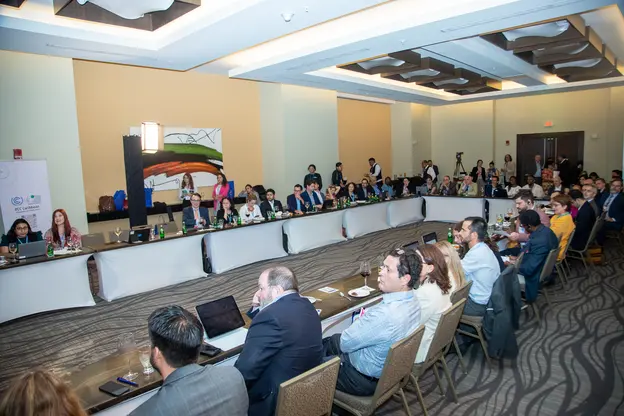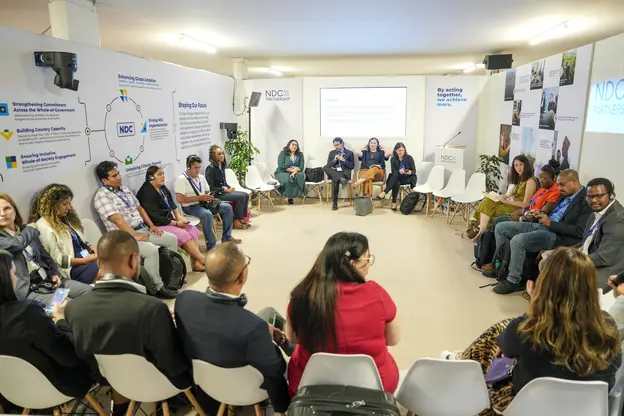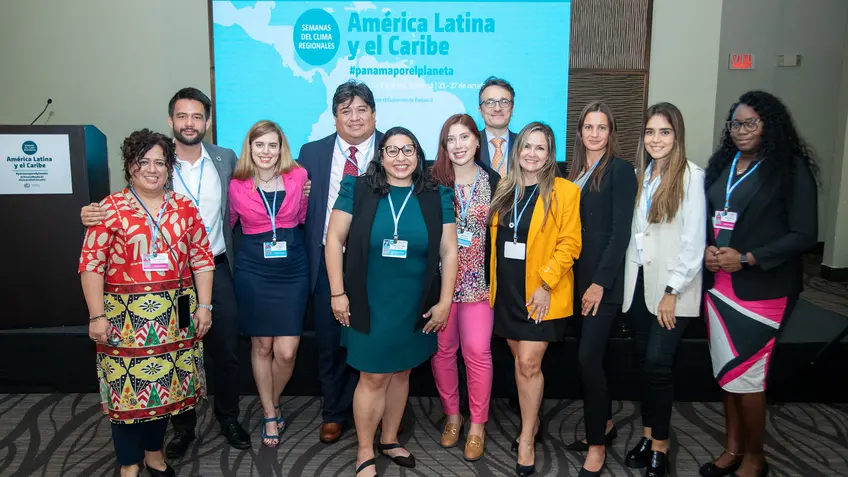Enhancing Collaborative Climate Action in Latin America and the Caribbean
Photo by Alberto Alexis
The final quarter of 2023 saw a huge push for greater collaboration on climate action in Latin America and the Caribbean (LAC).
Over 25 implementing agencies gathered during the first-ever Partners Gathering at the Latin American and Caribbean Climate Week (LACCW) in Panama to discuss partner coordination challenges and opportunities for more effective climate action in the region. This affiliated event, hosting cooperation agencies working on climate change and sustainable development in the region, was organized by the NDC Partnership Support Unit, the UNFCCC Regional Collaboration Centers (RCC) for Latin America and the Caribbean and the Euroclima Programme.
"We are gathered here because it is important to take stock of our collaboration as partners, to understand what is working and what is not and to find ways to strengthen our joint support to countries in this region for the development of more ambitious NDCs and LT-LEDS [Long Term – Low Emissions Development Strategies]," noted Andrea Camponogara, the RCC Global Lead from the UNFCCC Mitigation Department.
Participants actively discussed challenges and proposed solutions to improve partner coordination and mobilize resources to effectively address the escalating climate needs of countries. With the number of country requests to the NDC Partnership surpassing the rate of partner support, there is a pressing need to bridge the resulting support gap through more effective collaboration among partners.
Improving coordination and information sharing among partners and countries is vital to enhance transparency and mitigate duplication of support, a common challenge faced by cooperation agencies. "We cannot increase collaboration if appropriate coordination does not exist," remarked Fernando Andrade, United Nations Development Programme (UNDP) Regional Climate Change Specialist.
The importance of unified coordination was reiterated throughout, including the value of having a central coordination mechanism for climate action in the region. "I believe that the Partnership has a critical role in being able to coordinate us and keep us informed on the multiple efforts that are taking place," remarked Emily Weeks, Senior Policy Advisor at USAID.
The Support Unit emphasized the importance of partners clarifying their criteria and timelines for allocating resources to countries, which has been a limiting factor for countries seeking support. Partners also highlighted the necessity for country requests made to the NDC Partnership to align more clearly with broader strategic frameworks and indicate potential for transformative action.

Photo by Alberto Alexis
Events like the LAC Partners Gathering were recognized as crucial for promoting multilateral partner coordination, fostering innovative approaches and uniting efforts to tackle the region’s distinct challenges and needs. These gatherings were recognized as contributing to driving global cooperation toward alignment with shared objectives, with all participants eager for the Partnership to continue facilitating such exchanges.
Both the LACCW and the Partners Gathering were key opportunities for countries and stakeholders to reflect on collective progress, as well as challenges and gaps toward realizing the goals of the Paris Agreement. This created crucial momentum ahead of the presentation of the first Global Stocktake at last year’s UN Climate Change Conference of Parties (COP28).

Photo by Oscar Cablao - Hi Impact
At COP28, a LAC Regional Exchange was hosted at the NDC Partnership’s pavilion to continue hosting critical conversations from the perspective of country members. The session offered members a vital platform to discuss priorities, support needs and lessons learned in climate action. It also allowed the Support Unit to gather informal feedback on the Partnership model, knowledge gaps and opportunities for regional collaboration.
Countries in the LAC region are actively involved in the NDC Partnership, with 29 out of the 33 sovereign states in the region being members. Partnership highlights of the past six years include the provision of over USD16 million to the Climate Action Enhancement Package (CAEP), benefiting more than 20 countries in updating their 2020 nationally determined contributions (NDCs). Furthermore, support valued at USD11 million has been extended to 13 countries through the Global Call for NDCs 3.0 & LT-LED, aiding in the revision of their 2025 NDCs and the development of LT-LEDS.
Additionally, the Partnership has assisted 15 LAC countries in developing NDC implementation frameworks aligned with their NDCs and supported 10 countries in creating NDC Investment Plans or Climate Finance Strategies. More than 15 LAC countries have received national capacity-building support through NDC Partnership in-country facilitators. To address the support gap (which affects 35% of LAC country requests), the Partnership has provided a further USD5 million in back-stopping support to 17 countries through the Partnership Action Fund (PAF).
This holistic approach showcases the Partnership's dedication to catalyzing climate action and fostering collaboration. Insights gathered from the interactive meetings at LACCW and COP28 will guide ongoing national and regional initiatives, including Regional Climate Weeks, facilitating deeper regional peer exchanges and partner collaborations in 2024.
